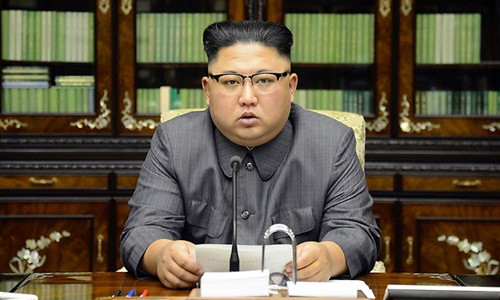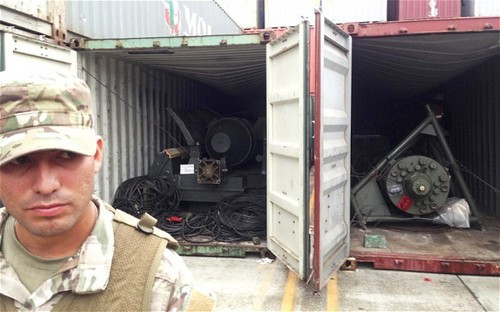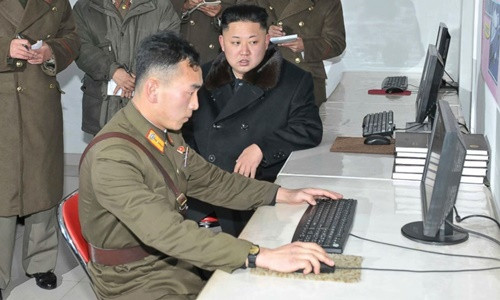Office 39 - the machine suspected of making billions of dollars for North Korean leaders
Office 39 is said to be responsible for bringing money into North Korea, through both legal and illegal means.
|
North Korean leader Kim Jong-un. Photo:AFP. |
At an office of the South Korean National Intelligence Service in Seoul, a North Korean defector sits anxiously, fearing that he could be in danger because of the information he holds, according toABC News.
For nearly five years, he worked for Office 39, the North Korean Workers' Party agency believed to be responsible for making money for the country's leadership. Now, with permission from South Korea's National Security Agency, he has revealed what he knows about Office 39 in a rare interview with an Australian television channel.
"Office 39 is the organization that earns foreign currency for the leader. In North Korea, we call it the 'revolutionary fund,'" he explained. "We export anything we can, gold, gems, agricultural products. We sell everything to make money for him."
The world's intelligence community is only just beginning to learn about Office 39 and its activities. According to experts, Office 39 is involved in both legal and illegal trade, bringing in between $500 million and $2 billion a year for North Korea. They are also accused of being involved in counterfeiting money and drug smuggling.
As North Korea faces a series of harsh sanctions over its nuclear and missile programs, Office 39 is clearly vital to leader Kim Jong-un's grip on power, writes Matthew Carney, a former senior fellow at the Center for Strategic and International Studies.ABC Newscomment.
Drugs, weapons and counterfeit money
Office 39 was established in the 1970s by late North Korean leader Kim Il Sung as a reserve fund.
North Korean defectorABC NewsThe interview confirmed that he only worked for the legal department of Office 39. He was an employee of Daesong, the conglomerate that controls much of the commerce in North Korea.
He was assigned to the Kumgang Trading Company, which sells ginseng, gems and gold across Asia. He would not reveal details of how the company operates, but said part of his job was to help sell gold mined and mined in North Korea, which they brought into China and then sold on the international market as Chinese gold.
He insists it is easy for them to evade UN sanctions. “You just change the company name and open branches in other countries,” he says. “It is very easy to operate in China. The border is thousands of kilometers long and always open. So it is very easy to move goods across.”
On the other hand, the US and the UN also accused Office 39 of running a network of illegal money-making activities such as counterfeiting, drug trafficking and weapons. North Korea's fake $100 bill is considered the most realistic counterfeit money in the world. This was a big source of income for Office 39 until the US government stepped in to stop it.
Office 39 is suspected of manufacturing drugs for sale in Japan and other parts of Asia. Australian authorities intercepted a shipment of 50 kg of heroin from North Korea in 2003.
In recent years, several shipments of weapons originating from North Korea have been seized around the world. In 2013, a cargo ship carrying ammunition and missile parts was seized in Panama. The ship’s owner, Chongchongang Shipping Company, is believed to be a front company for Office 39.
|
A Panamanian soldier stands guard next to the weapons containers of the Chongchongang ship. Photo:Reuters. |
North Korean defectorABC NewsThe interviewee said he knew nothing about the above activities but admitted that "North Korea is finding it increasingly difficult to carry out illegal activities because the world has become more vigilant."
Office 39 now increases revenue from businesses inside North Korea, such as fishing, aquaculture, mining and textiles, to support the leader and his nuclear and missile programs.
Cyberspace
According to observers, in order to increase revenue, Office 39 is shifting to conducting illegal activities in cyberspace.
In 2016, US investigators suspect North Korean hackers nearly stole $1 billion from the New York Federal Reserve, but a small typo prevented the attempt.
At that time, hackers tried to steal an account of the Bangladesh Central Bank at the New York branch of the Federal Reserve. However, authorities became suspicious because they discovered that the withdrawal request had a typo, changing the word "foundation" to "fandation." However, the hackers still managed to get away with $81 million before being stopped.
|
North Korean leader Kim Jong-un watches a military soldier work on a computer. Photo:KCNA. |
ABC NewsNorth Korea has successfully hacked into South Korean banks and even stolen war plans from South Korean military computer networks, according to reports.
Go Myong-hyun, an expert at the Seoul-based Asia Institute for Policy Studies, said that Office 39 has thousands of hackers and has devoted a significant amount of resources to cyberspace.
“Cyber activities are harder to detect and control, so this is clearly the perfect front for them,” Mr. Go commented.



